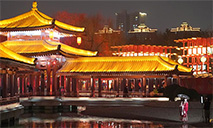Snowy Beijing 2022 well protected by meteorological, operations teams
As Beijing woke up to its first snow in the Year of the Tiger on Sunday, some outdoor events of the Winter Olympic Games faced unfavorable conditions. But thanks to the Games' strong meteorological security, three games have been postponed due to heavy snow so far but athletes and related personnel were fully protected.
Of the three competition zones in Beijing, its Yanqing district and neighboring Zhangjiakou in Hebei Province, the Zhangjiakou zone was most heavily hit by the snow, which started on Saturday morning and is not expected to stop until Monday.
Snowfall in some areas in Zhangjiakou and Yanqing reached blizzard conditions, and the lowest temperatures could reach -20C. However, many games proceeded despite the weather, including the mixed team snowboard cross on Saturday, with all volunteers on duty. The Organizing Committee also prepared raincoats for the spectators to shield them from the snow, the Global Times has learned.
Snow could affect the course or ski run as the air temperature rises when it snows, and further affects the snow temperature and quality of the track. In that case, the type and amount of waxing for athletes' skis and snowboards must be adjusted. Meanwhile, fresh snow makes the track surface soft and increases friction, which can adversely affect athletes' performance.
When the temperature drops too low, the snow gets really hard, which means more difficult landings for athletes, Swiss snowboarder Nicolas Huber told the Global Times. "But we are professional, so we can manage it."
"The large amount of snow may have some impact on the games, but forecasters can find a window where athletes can compete during a period of relatively low snowfall," Huang Shanjiang, director of Zhangjiakou Meteorological Station, was quoted by Science and Technology Daily as saying. "So the games are at most delayed or postponed, but not interrupted."
The Women's Freeski Slopestyle qualification, Women's Aerials qualification and Men's freeski Slopestyle qualification were the three events that were postponed due to the heavy snow as of press time, as the necessary visibility could no longer be assured.
Before the Organizing Committee announced the race was postponed, the mountain events operation team and waste removal team had been clearing the course, and the traffic team was continuing to clear the snow from the roads to provide traffic security for athletes and staff.
Vice president of the Organizing Committee Yang Shu'an explained on Sunday morning that on some courses in the Genting Snow Park in Zhangjiakou, the track should be shaped twice with pressed snow, so there must not be too much drifting snow on the track, the Global Times learned from Sunday's press conference.
Although the team had cleared the drifting snow before the starting point of the Women's Freeski Slopestyle, it was delayed because of the lack of visibility in order to ensure the safety of the athletes, Yang said. "We still need to clear the drifting snow from the track before the next game day starts, which we have prepared enough forces to accomplish."
Yang noted that the meteorological departments have provided accurate weather forecasts for the Games so far, which is crucial to the smooth running of the event.
The Global Times learned from the Organizing Committee that for Sunday's snowfall, the forecast came in nine days ago, and the timing and amount of snowfall for each venue were basically determined two days ahead of time.
The relevant venue operation team launched an emergency plan on Friday. In addition to the snow and ice removal team, a 500-person flexible emergency team also joined the non-stop mission to ensure the normal operation of the venues.
The operation teams have also been working closely with the international federations and weather forecasting teams, providing and discussing daily updates on weather conditions, said Yang. According to the daily conference, the teams make sure that all games can be carried out smoothly on schedule.
As the first Winter Olympic Games to be held in a continental climate region, the meteorological security of the Beijing Winter Olympics faces unprecedented challenges, Wang Gengchen, head of the research team of the Beijing Winter Olympics meteorological security, told the Global Times on Sunday.
"In order to cope with the climatic phenomena unique to Beijing's winter, the meteorological security team started its research very early, summarizing the experiences of Sochi and Pyeongchang Olympics," Wang said with confidence. "A large number of meteorological scenario studies were done, and unprecedented high requirements for detailed weather forecasting were put forward."
Media reports showed that Zhangjiakou built a three-dimensional, second-level, multi-factor meteorological observation network, including more than 160 automatic weather stations and 10 radars, becoming the most complete meteorological observation system for the Winter Olympics.
Saturday marked the halfway point of the Winter Olympics, as athletes have won 58 gold medals and broken 13 Olympic records and two world records.
"In traditional Chinese culture, there is a saying that heavy snowfall represents a good harvest," one Winter Olympics spectator wrote on China's Twitter-like platform Sina Weibo. "Let's expect that the athletes will have a good harvest after the snow stops, with good performances in the Games!"
Photos
Related Stories
- World Olympians shine with Beijing memories
- In pics: bobsleigh women's monobob heat at Beijing 2022
- Feature: U.S. snowboard veterans write legend in dancing snowflakes
- Interview: Swiss snowboarder Pat Burgener plans music career in China after Olympics
- United States Team 1 crowned in mixed team snowboard cross at Beijing 2022
Copyright © 2022 People's Daily Online. All Rights Reserved.










